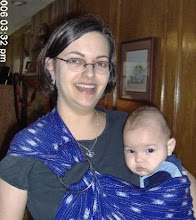"Because there is no regulatory law now, if someone is saying they are a midwife when they don't have all the training, the only thing the state can do is go into court," [Katie Prown of the Wisconsin Guild of Midwives] said.With regulation, you also get peer review, administrative hearings, and civil litigation. When a baby dies in a hospital, is the doctor ever arrested? Of course not. It would make no sense. If the doctor is incompetent or acted with negligence or worse (and sometimes when she hasn't) she gets sued, investigated by the state licensing board, and so forth. The criminal justice system is just no place to deal with a birth gone awry.
"You have to wait for something bad to happen. Investigating health care practices through the court system is expensive. It makes much more sense to bring things under a regulatory structure," Prown said.
Although the legislation was introduced in the Assembly before the baby's birth and death during delivery, it gained momentum after the death. The prosecution, meanwhile, is something seldom seen anywhere in the country.I wanted to point out that midwives in illegal or "alegal" states have a real dillema when it comes to carying pitocin, oxygen, and other drugs and medical equipment. On the one hand, these supplies can save lives in an emergency. However, they open the midwife up to more charges such as "unauthorized delivery of a prescription drug." A midwife could go to jail for saving the life of her client.
Helen E. Dentice, 51, of Milwaukee has been charged in a criminal complaint with second-degree reckless endangerment, unauthorized delivery of a prescription drug and practicing medicine without a license.
The charges were filed in Waukesha County Circuit Court last month after a lengthy review of the circumstances of the Nov. 28 stillbirth at the rural Vernon home of Brian and Bridget Stoiber.
Quotes above are from the Milwaukee Journal Sentinal article; and also see the Kaiser Network article.




No comments:
Post a Comment